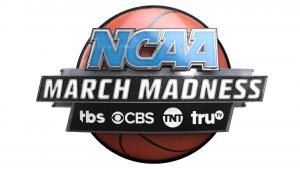
This article is a companion piece to Episode 13 of the Pop Culture Coram Deo Podcast. Subscribe for more engagement of pop culture in light of God’s glory (iTunes, Google Play, Stitcher, Tune In, acast, Player.FM).
Sixty-four teams, 1 winner and 63 losers; that’s the plight and intrigue of March Madness. Winners are remembered for a while; losers are often forgotten. That doesn’t sound like freedom. . . even for the winners.
Yet, in Christ, Christians possess a Loser and a Winner that will be remembered and exalted forever. He both lost his life and won the only battle that ultimately matters–the battle against our sinful hearts, death, this sinful world, the evil One, and God’s wrath. In other words, Christ won the only battle of eternal significance. This Sunday is Easter Sunday, when we celebrate the Father’s sending of His Son, the God-Man, by the Spirit to conquer sin, the evil one, and death. And His loss and triumph truly frees Christians to enjoy sports, neither as ultimate nor as insignificant, but as an avenue through which to reveal God’s glory.
Enjoying Christ’s resurrection frees us to enjoy sports. But, how?
Idolatry and Sports
Like with anything else in this life, with sports, there is a danger for those who are not consistently enjoying Christ’s resurrection as ultimate. One danger is idolatry. The danger is real for both the sports figure and the fan that gives him or her a god-like status.
Sports figures can become larger than life, gods of their own coliseums, praised by millions or billions of people. This can produce a win-at-all costs mentality. This is prevalent at all levels of sports; even in high school football programs of rural Tennessee, coaches have given players performance-enhancing drugs. Winning has become so important that there’s an accepted phrase in many sports, “If you ain’t cheating, you ain’t trying.” When people believe this life is all there is, seizing the moment and winning at all costs, becomes an idol. False gods must win, for their god-status is based on winning, not God’s glory. The scandals in all sports concerning performance-enhancing drugs reveals this reality. For example, in the 2018 Winter Olympics, the curling gold medalists from Russia lost their medals due to testing positive for performance-enhancing drugs. Curling is one of the least-athletic events at the Winter Olympics. Of course, there is much skill needed to win, but guys like me identified with the USA team because the male curler was built like me; and I’m a preacher, not much of an athlete.
When athletes are willing to use performance-enhancing drugs, God’s glory is not the goal, man’s glory is.
Additionally, due to the pursuit of god-likeness, show-boating has become prevalent in sports as well. Now, we don’t want to assume the worst of athletes, but we also don’t want to give them a pass if they have a “me-first” attitude either. There’s nothing inherently wrong with celebrating, but selfish, arrogant show-boating shouldn’t be praised. One thing that drives me nuts about the NFL and NBA is when former players justify the selfish arrogance of players on the field or court by making statements like, “That’s what it takes to be the best,” or, “He just wants his team to win.” Come on man!
At one time, show-boating was frowned upon in sports. But, I believe one man, primarily, changed how athletes and fans view show-boating; that man’s name is Muhammad Ali. Muhammad Ali is arguably the greatest boxer of all time, and the best showman in all of sports history. He knew how to promote a fight. Yet, there were times he was willing to sacrifice the reputation of his opponent for the sake of self-promotion. In the 1970’s, the Jim Crow era was legally over, but not really over. Many schools were still segregated and there were civil rights battles still going on in the courts. Many blacks and whites were still at great odds with one another. Ali capitalized on this racism by arguing that his opponent, Joe Frazier, was an “Uncle Tom” on the white-man’s side against the blacks. He basically argued that Frazier hated his own race. Frazier and Ali fought three times, Frazier winning the first and Ali winning the next two. But, Ali’s punches did not hurt Frazier as much as his words did; Ali scarred Frazier for life. Frazier recalled many years later,
I hated Ali. God might not like me talking that way, but it’s in my heart. I know things would have been different for me if he hadn’t been around. I’d have gotten a lot more respect. I’d have had more appreciation from my own kind. Twenty years I’ve been fighting Ali, and I still want to take him apart piece by piece and send him back to Jesus.[1]
Later, Frazier said he forgave Ali. And Ali lamented how he hurt Frazier’s reputation,
I said a lot of things in the heat of the moment that I shouldn’t have said. Called him names I shouldn’t have called him. I apologize for that. I’m sorry. It was all meant to promote the fight.[2]
It’s one thing to put on an entertaining show; it’s another thing entirely to put on an entertaining show at the expense of another. One can be a showman without dehumanizing one’s opponent. Like any form of slander, even if we’re trying to promote a fight, once those words are made public, they cannot be taken back. The damage is done. The “toothpaste is out of the tube and it cannot be put back in.” Christians are not free to devalue their opponents in any sport, ruining their reputations for the sake of publicity.
But the idolatry in sports is not reserved only for the athletes, idolatry is a struggle for the fans as well. False gods are created by men, yet false gods can never satisfy, especially when they are human. There’s a type of federal headship that takes place between the loyal fan and the athlete or sports team. And when the fan does not trust Christ as his or her ultimate Federal Head, he or she searches for lesser federal heads to satisfy. But lesser federal heads can only satisfy, at best, temporarily, and at worst, never. This is evident by the love and hatred that exists for one team or player over another, from one season to the next. Often, you can tell if a fan’s team won or lost based on his or her mood after the game. Fans tie their happiness to sports teams, and some even tie their joy to them.
But Christ offers freedom beyond athletes and sports teams. He offers an ultimate, eternal freedom, through His resurrection.
The Answer to Idolatry in Sports
The apostle Paul made a peculiar statement in Philippians 4:13 that athletes often quote when they win, “I can do all things through Christ who strengthens me.” These words are peculiar because Paul wasn’t “winning” when he wrote them. He wrote these words from prison. He was preaching the gospel in obedience to Christ and god locked up for it. Paul’s point is not that he can only win due to Christ strengthening him, but that he can also lose due to Christ strengthening him. Consider the two verses prior, Philippians 4:11-12,
11 Not that I speak in regard to need, for I have learned in whatever state I am, to be content: 12 I know how to be abased, and I know how to abound. Everywhere and in all things I have learned both to be full and to be hungry, both to abound and to suffer need.
Paul’s point is that trusting in Christ frees him to endure whatever happens in this life. If you have Christ, you have all that you need, whether you are rich or poor, full or hungry, or whether you win or lose. In other words, trusting in Christ’s life, death, and resurrection frees us to truly enjoy this life, because whether we win or lose, in Christ, we win eternally. And no opposing athlete or team can change this reality. In March Madness, our team may lose (my teams already have), but this loss cannot sever them or us from Christ. And neither a good athlete nor a good basketball team can send Christ back to the tomb.
God has called us, not to be winners necessarily, but to be Christians. Jesus Christ has won the battle for us, the ultimate battle against sin, judgment, and God’s wrath for us. He’s won the only battle that really matters. Repentance and faith in Him, receiving God’s forgiveness through Him, frees us to win or lose for God’s glory.
Therefore, because Christ satisfies us eternally, whether we or our teams win or lose, we remain satisfied in Christ. At the very least, we are free to play excellently, because the ultimate battle has already been won for us by Christ. Christians should be the best athletes for this reason; we do not have to win the game, match, season, or tournament. We only have to play our best; that is what God requires of us. He requires us to glorify Him with our gifts. Thus, winning isn’t everything; God’s glory is. And God is more glorified in a self-less loser than a selfish winner.
Conclusion
In conclusion, repentance and faith in Christ, His finished work, means that we don’t have to finish the work for Him. Our salvation is secure forevermore regardless whether we win or lose. Because Christ lost in our places, and conquered death, rising from the dead, winning our salvation, He has freed us to enjoy this life, when we win and when we lose, when we’re healthy and when we’re ill, when we’re rich and when we’re poor, etc.
In other words, enjoying Christ’s resurrection frees us to enjoy sports.
Remember that as you enjoy March Madness, the Final Four, and the Championship!
[1] http://www.theguardian.com/sport/2011/nov/08/muhammad-ali-joe-frazier
[2] http://www.theguardian.com/sport/2011/nov/08/muhammad-ali-joe-frazier












